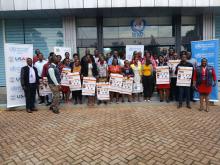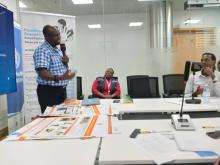WHO trains mpox most at risk population health service providers
Kampala. The World Health Organization (WHO) with support from the United States Agency for International Development (USAID) has trained 43 Most At Risk Populations Initiative (MARPI) health service providers to support surveillance activities and risk communication and reporting of mpox among key populations in Kampala and other districts of their reach.
MARPI health service providers support prevention, detection, reporting and management of mpox among key and priority populations in Kampala such as sex workers and people living in congested settings. These groups face unique barriers such as stigma, discrimination, and limited access to healthcare services, which complicates disease control efforts, increasing the likelihood of widespread transmission and putting additional strain on an already burdened healthcare system.
“Key populations often delay seeking healthcare due to stigma and discrimination, which can lead to late diagnoses and increased disease transmission. Tackling these barriers through inclusive, non-discriminatory healthcare practices and messaging is critical to ensuring equitable access to mpox testing, treatment, and vaccination,” said Dr Charles Okot, mpox Incident Manager at WHO Uganda Country office.
Uganda confirmed its first mpox case on 24 July 2024, with two patients from Kasese district identified through routine surveillance. By 19 November 2024, there were 609 confirmed cases and two deaths. Most of the confirmed cases are from agriculture and fishing communities, sex workers, the service industry, and prisoners among others.
WHO and Uganda’s Ministry of Health (MOH) have been collaborating to strengthen the country’s mpox preparedness and response capacities, focusing on enhancing diagnostic capacity, reinforcing surveillance, and implementing risk communication strategies targeting high-risk groups.
As the mpox outbreak continues to evolve, Uganda’s response strategy must prioritize rapid detection, efficient case management, and targeted interventions to mitigate further spread, particularly among vulnerable populations. Collaborative efforts between national authorities, international health organizations, and local communities will be critical to ensuring the successful containment of mpox and preventing its spread beyond Uganda’s borders.
While MOH and its partners have established surveillance mechanisms to respond to the mpox epidemic, a significant gap remains in extending these efforts to hidden populations. Despite being some of the largest carriers of the epidemic, these groups have been notably left out of the existing response efforts. MARPI aims to fill this critical gap by augmenting MOH’s initiatives, ensuring that mpox interventions are inclusive, culturally sensitive, and specifically tailored to address the needs of key populations who are currently underserved in the ongoing response.
With extensive experience in serving key populations across over 22 districts in Uganda, MARPI is well-positioned to lead the response to mpox among key, vulnerable, and priority populations.
“As a multifaceted organization, MARPI delivers a wide range of behavioral, biomedical, and structural interventions tailored to high-risk and marginalized groups often underserved by mainstream health services,” said Brenda Mary Namirembe, a programme manager at MARPI.
MARPI will work closely with WHO, MOH, UNAIDS, UNICEF, Infectious Diseases Institute, Baylor Uganda, Kampala Capital City Authority, and local governments among others at various levels to ensure that the mpox key population response aligns with the broader national guidelines and strategies of the broader national mpox response. This partnership will extend to regional implementing partners who will facilitate coordination and outreach efforts at regional referral hospitals and health centers.
"With combined efforts and targeted training like this, we can enhance our ability to respond swiftly to this mpox outbreak," said Haruna Lule, a programme management specialist at USAID.

